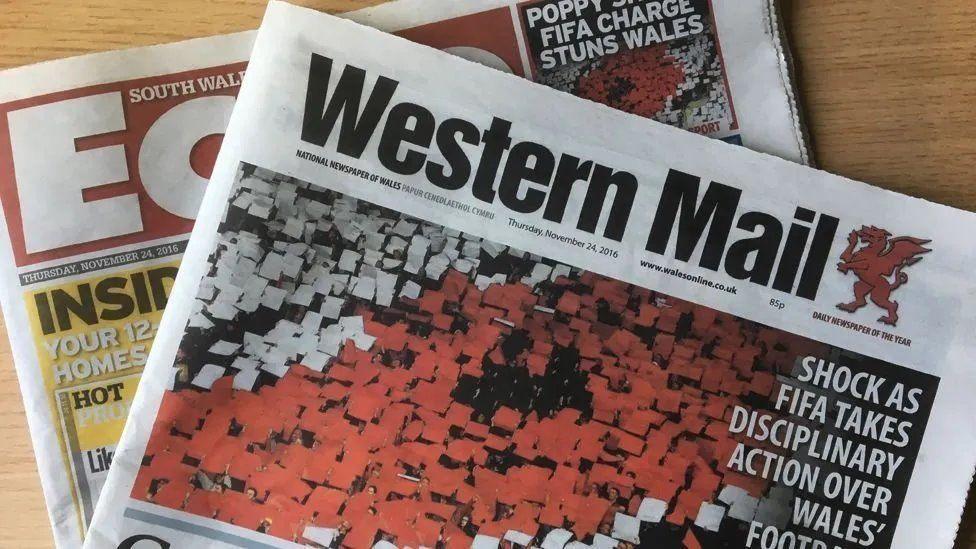Welsh government U-turns on newspaper notices

- Published
Plans to end the legal requirement for councils to publish notices of changes to tax in local newspapers have been dropped by the Welsh government.
Minister Rebecca Evans said she recognised the "strength of feeling" over the issue.
Newspapers had warned it could "damage" Welsh journalism and ran a joint front page campaign on Monday asking Welsh Labour to think again.
It is the second concession the government has made to the opposition over legislation in two weeks, and came after some Labour Senedd members had backed calls for public notices in local newspapers to continue.
Last week the Welsh government promised its own ban on politicians lying after it faced losing a Senedd vote.
- Published31 January 2024
- Published24 January 2024
- Published17 June 2024
Council tax updates are not the only notices councils are required to place in local newspapers.
Welcoming the decision, Newsquest regional editor Gavin Thompson was concerned the move, had it gone ahead, could have been the thin end of the wedge.
"Once the precedent is set, once the first brick in the wall is taken away, we were concerned that the next time legislation comes up on planning, on traffic and so on, that they follow suit.
"If you take away statutory public notices from local newspapers, a good number of Welsh newspapers would not be profitable."
Newsquest, which publishes the South Wales Argus and the Leader in Wrexham - had joined forces with Reach, which produces the Western Mail, WalesOnline and the South Wales Echo, among others.
Unreadable
The changes, which were included in the Welsh government's Local Government Finance (Wales) Bill, would have replaced the current obligation with a requirement to publish a notice on the local authority's website.
It would have required councils to "put suitable alternative arrangements in place to ensure that such information is accessible to citizens who have difficulty accessing online facilities".
In June Swansea East Labour MS Mike Hedges tabled a statement of opinion in the Senedd, which supported "the provision of council public notices in local newspapers". It was signed by 13 MSs, including four from Labour.
Opposition parties were also concerned and the Conservatives had tabled an amendment, debated on Tuesday, to scrap the legislation from the bill.
The debate showed a difference of opinion among Labour MSs, although more spoke in support of the original plans than against.
Mr Hedges said: "There's a lot of elderly people who rely on printed media in order to get information. There's also a problem of people putting things out on social media and other forms of media that are easily edited, easily changed to give entirely incorrect information."
Some expressed concerns over the size of the print in the notices. Jenny Rathbone, Labour MS for Cardiff Central, said: "A lot of these newspaper notices are actually unreadable to most people, because they're in a font that is so small that particularly elderly people, which are some of the most avid readers of local newspapers, are simply not going to be able to read them."
Labour Llanelli MS and former minister Lee Waters said: "I think it's important we don't confuse means and ends here. I think the ends we want to see is to support local journalism.
"Subsidising impenetrable advertisements is not the way to do that."
'Vital source of revenue'
BBC Wales was told earlier in the day that the Welsh government had attempt to add an amendment of its own, but it had been turned down by the presiding officer because it came too late.
Instead Labour abstained on the Conservative amendment, which was passed with 24 votes for, two against and 23 abstentions.
Most of the abstentions were from Labour - the two against were Alun Davies, Labour MS for Blaenau Gwent, and Lesley Griffiths, a government minister.
Conservative Monmouth MS Peter Fox suggested in the Senedd that it might have sought a "transition period that would enable this to kick in over a five-year period".
He thanked Rebecca Evans, finance secretary, "for trying to introduce a late amendment to find a way forward on this. I really do thank her for her engagement with this. Unfortunately that wasn't to be".
Plaid Cymru's Peredur Owen Griffiths said it would have been a "retrograde step, in terms of upholding the rights of the public to access information, especially those that are digitally excluded".
Rebecca Evans told the Senedd she did not think it was "reasonable to argue that the loss of revenue generated from one advert per financial year, which might bring in as little as £600, would make a newspaper unsustainable".
"But I do agree with colleagues this afternoon who have talked about the importance of having that wider discussion about what's really a much more complex issue in terms of how we support local media and also how we communicate most effectively with residents."
She added: "I do absolutely recognise the strength of feeling amongst colleagues on this particular issue, and I'm always keen to find areas of compromise, where we can, and to work with other parties."
Unlike last week's debate over a ban on politicians lying, it had not been evident that ministers were facing losing a vote.
However some speculated in the Senedd, including one Labour source, that ministers may have allowed the amendment to pass because they feared a rebellion.
Another Labour source said that such a rebellion had been unlikely.